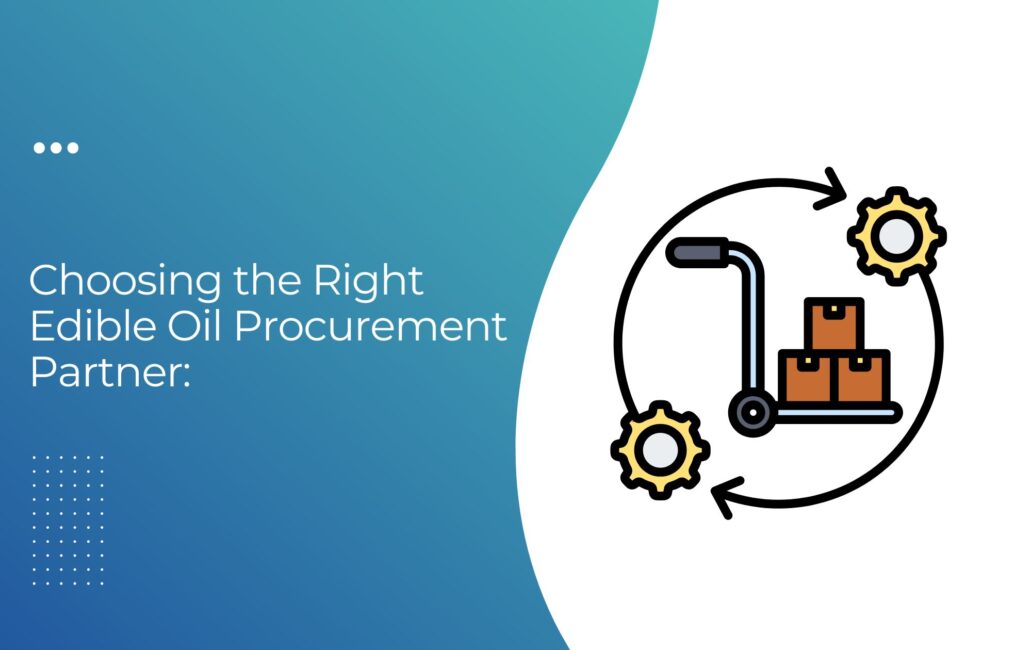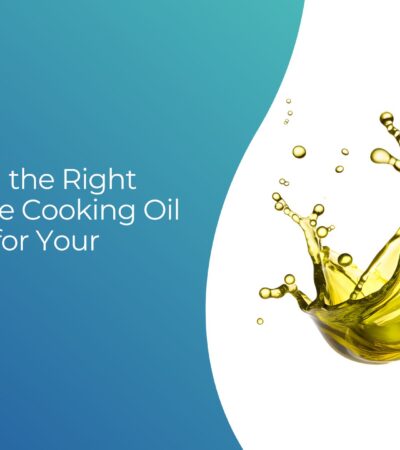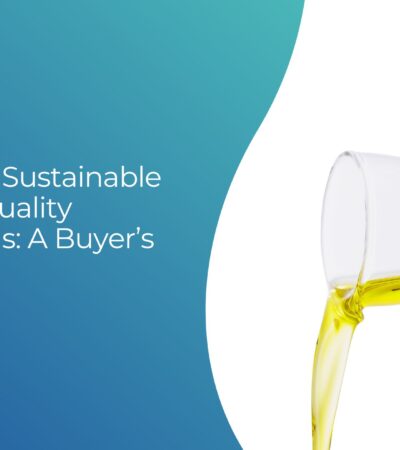Choosing the Right Edible Oil Procurement Partner: Key Factors to Consider

The edible oil industry has always been one of the cornerstones of global trade. From the sunflower oil used in everyday cooking to soybean oil in packaged foods, from maize oil in animal feed to palm oil in cosmetics and biodiesel — the demand for edible oils touches almost every sector. Businesses across food processing, FMCG, pharmaceuticals, and even renewable energy rely heavily on a consistent and quality supply of edible oils.
Yet, while demand is rising year after year, the process of edible oil procurement is far from simple. Price volatility, fluctuating supply chains, evolving regulations, and sustainability concerns make the decision of selecting the right procurement partner more crucial than ever. The wrong partner can expose businesses to risks like delayed shipments, substandard quality, or even regulatory non-compliance. On the other hand, the right partner ensures cost efficiency, consistency, and a strong foundation for growth.
This blog takes a closer look at the critical factors businesses must consider when choosing an edible oil procurement partner. We’ll also examine the broader landscape, discuss the biggest challenges in sourcing, and highlight why strategic alignment with your supplier is vital for long-term success.
The Importance of Partnering with the Right Supplier
When companies think of procurement, cost savings often come to mind first. While competitive pricing is important, procurement decisions — especially in commodities like edible oils — carry consequences far beyond the balance sheet.
A procurement partner isn’t just a middleman who sources products. They play a vital role in shaping your entire supply chain. An unreliable partner could result in inconsistent quality, late shipments, and ultimately damage to your brand reputation. Think of a bakery chain receiving palm oil with high free fatty acid content, or a packaged food manufacturer facing a stockout because their supplier failed to deliver on time. These disruptions ripple through production schedules, increase costs, and hurt customer trust.
By contrast, a strong procurement partner acts as a shield against such risks. They bring market intelligence, manage price fluctuations, maintain compliance with safety standards, and ensure that your business doesn’t face unexpected supply shocks. In many ways, your procurement partner becomes an extension of your own operations — one that directly influences product quality, brand reputation, and long-term profitability.
Understanding the Global Edible Oil Landscape
Before diving into the selection criteria for a procurement partner, it’s important to understand the dynamics of the edible oil market itself. This is a sector that doesn’t just respond to demand and supply like other commodities — it is also shaped by weather conditions, international politics, shipping logistics, and shifting consumer preferences.
A Market Driven by Multiple Oils
The global edible oil industry revolves around several major oils: palm, soybean, sunflower, maize (corn), canola, and rice bran. Each has its own production hubs — palm oil from Indonesia and Malaysia, soybean oil from South America and the US, sunflower oil from Ukraine and Russia, maize oil from India and the US, and so on. Any disruption in these regions directly affects global prices and supply.
Demand Factors
Edible oils are no longer just about cooking. Food processors need them for snacks, bakery items, and packaged goods. Pharmaceutical and cosmetic industries use them in formulations. Renewable energy companies rely on oils like palm and soybean for biodiesel production. This diverse demand keeps the market active and highly competitive.
Unavoidable Challenges
Businesses face a wide range of hurdles when sourcing oils. Extreme weather can reduce yields, while geopolitical tensions can disrupt shipping lanes. Price volatility is almost constant — influenced by everything from crude oil markets to currency fluctuations. These are some of the most persistent challenges in edible oil procurement, and they highlight why selecting the right partner is not a simple transactional decision but a strategic one.
Key Factors to Consider When Choosing a Procurement Partner
Now that we’ve seen the complexity of the edible oil market, let’s move to the core question: what exactly should you look for in a procurement partner? Choosing wisely can mean the difference between a stable supply chain and one plagued by uncertainty. Below are the most critical factors to evaluate.
1. Product Quality & Certifications
For industries that depend on edible oils, quality is non-negotiable. A single batch with impurities or a high peroxide value can compromise entire product lines. Reliable procurement partners understand this and place rigorous emphasis on quality checks.
When evaluating a partner, ask about their quality assurance processes. Do they test for free fatty acids (FFA), peroxide value, and moisture content? Do they conduct third-party lab checks? Quality in edible oils isn’t just about taste or color — it directly impacts shelf life, safety, and performance in end products.
Equally important are certifications. Look for suppliers who can provide compliance with standards such as FSSAI (Food Safety and Standards Authority of India), BIS (Bureau of Indian Standards), ISO, HACCP, Halal, and Kosher. These certifications serve as proof that the oils meet both domestic and international benchmarks, ensuring your brand remains compliant across markets.
2. Supply Reliability & Consistency
Even the best-quality oil is useless if it doesn’t arrive on time. Reliability in supply is one of the biggest differentiators between an average and an excellent procurement partner.
Supply disruptions can occur due to seasonal shortages, port delays, or geopolitical issues. A dependable partner anticipates these challenges and has backup arrangements in place. They maintain diversified sourcing channels — not relying on a single country or supplier. They invest in strong logistics networks to ensure shipments arrive as promised.
When assessing a procurement partner, ask:
- How do they manage supply chain risks?
- Do they have long-term contracts with refineries or mills?
- How do they handle seasonal fluctuations?
A partner who can consistently deliver under challenging conditions is one worth keeping.
3. Pricing Transparency & Cost Control
Price is often the first metric buyers look at — but it’s also one of the most misleading if seen in isolation. The edible oil market is notoriously volatile, with prices fluctuating due to harvest yields, demand surges, or currency swings. Procurement partners who only quote attractive rates upfront but don’t explain their pricing models can expose businesses to hidden costs later.
The best partners offer transparency. They explain how prices are structured, provide market intelligence updates, and offer flexible options like fixed-price contracts or hedging strategies. This allows buyers to plan better and avoid unpleasant surprises.
Moreover, true cost savings often come from efficiency rather than bargain hunting. A transparent procurement partner helps you understand total landed costs — including freight, insurance, duties, and storage. This clarity gives you the ability to forecast and budget more effectively.
4. Edible Oil Sourcing Strategy Alignment
Every business has its own procurement priorities. Some prioritize the lowest cost, while others may emphasize sustainability, traceability, or diversification. The right procurement partner should align with these goals instead of forcing a one-size-fits-all approach.
For example, a global FMCG company may insist on sourcing only RSPO-certified sustainable palm oil. A food processor may want non-GMO soybean oil to cater to health-conscious consumers. A pharma company may require pharmaceutical-grade castor oil. Each of these goals represents a unique edible oil sourcing strategy, and your procurement partner should be flexible enough to support it.
During evaluation, ask partners how they tailor their sourcing approach to meet specific industry requirements. Do they offer customization? Are they proactive in recommending sourcing alternatives when market conditions change? A partner who understands and aligns with your long-term strategy is far more valuable than one who simply delivers the cheapest option.
5. Compliance with Regulatory & Quality Standards
One of the biggest risks in edible oil procurement is failing to meet regulatory requirements. Food safety authorities worldwide have stringent rules about chemical composition, contaminants, labeling, and storage. In India, for example, the Food Safety and Standards Authority of India (FSSAI) has clear benchmarks for free fatty acids, moisture, and adulteration limits. In the US, it’s the FDA. Globally, Codex Alimentarius sets standards that many countries adopt.
A reliable procurement partner ensures full compliance with these standards. They don’t just claim quality — they document it. They provide certificates of analysis, batch test results, and ensure oils are traceable back to the source. Non-compliance can lead to heavy penalties, shipment rejections, or, worse, product recalls that can damage brand reputation.
This is why compliance isn’t negotiable. Your partner should treat regulatory adherence as part of the service, not an optional add-on.
6. Logistics, Packaging & Storage Capabilities
The journey of edible oil doesn’t end at procurement; it extends into logistics, packaging, and storage. Even the best-quality oil can be compromised if it isn’t transported or stored correctly.
Top procurement partners manage end-to-end logistics. They understand whether your order is best shipped in ISO tanks, flexitanks, or drums, depending on volume and destination. They ensure that oils are packaged securely to avoid contamination and maintain shelf stability.
Storage is another critical factor. Oils are sensitive to light, temperature, and oxidation. The right partner offers warehousing facilities that maintain appropriate conditions to prevent degradation. For large buyers, partners may even assist with inventory management — ensuring you don’t face shortages or unnecessary overstock.
7. Sustainability & Ethical Practices
In today’s business environment, sustainability isn’t just a buzzword — it’s a necessity. Consumers are increasingly aware of the environmental and ethical implications of the products they use, and regulators are tightening rules around sourcing.
A progressive procurement partner understands this and aligns with global standards for sustainable sourcing. For palm oil, that means certification by the Roundtable on Sustainable Palm Oil (RSPO). For soybean or maize, it may mean sourcing non-GMO or organic-certified variants. Beyond certifications, sustainability also means ensuring fair labor practices and reducing the carbon footprint of logistics.
By working with a partner committed to ethical and sustainable practices, businesses can strengthen their ESG (Environmental, Social, Governance) profile while meeting market demand for eco-conscious products.
8. Customer Service & Relationship Management
Procurement is not a one-off transaction; it’s an ongoing relationship. Delays, sudden demand spikes, or quality concerns are bound to arise at some point. The difference lies in how a partner responds to these situations.
Strong procurement partners offer responsive communication. They assign dedicated account managers, provide real-time shipment updates, and proactively flag potential disruptions. They don’t just deliver oil — they deliver peace of mind.
When evaluating a partner, consider how accessible and transparent their customer service is. Do they answer calls promptly? Do they offer solutions instead of excuses? Do they treat smaller orders with the same importance as larger ones? These may sound like soft factors, but they are often the ones that make the biggest difference when challenges arise.
The Role of Technology in Modern Procurement
Procurement is no longer about paper contracts and phone calls. Technology has transformed the way businesses source and manage edible oils. Modern procurement partners leverage digital platforms, ERP systems, and analytics to provide buyers with transparency and efficiency.
For instance, digital dashboards can provide real-time updates on shipment status, inventory levels, and pricing trends. Predictive analytics tools can forecast price movements based on market data, helping buyers make better decisions. Blockchain solutions are being adopted for traceability, ensuring oils can be tracked from plantation to production line.
Working with a technologically advanced partner reduces risks of miscommunication, speeds up processes, and ensures better accountability. In a world where agility often decides competitiveness, tech-enabled procurement is no longer optional.
Case Study: When the Right Partner Makes the Difference
Consider the case of a mid-sized food manufacturer in India that relied on multiple small suppliers for its sunflower oil requirements. While prices initially seemed competitive, the company often faced stockouts and inconsistent quality. Shipments would arrive late, production schedules would stall, and customer complaints about product consistency increased.
Frustrated, the manufacturer shifted to a professional procurement partner with global networks and quality assurance processes. Within six months, the company saw a significant reduction in delays, achieved better control over costs, and improved end-product quality.
This example highlights a crucial truth: choosing the right partner isn’t just about the oil you buy — it’s about the stability, reliability, and trust you build into your supply chain.
Steps to Evaluate and Onboard the Right Partner
Finding the right procurement partner requires more than scanning a supplier directory. Here’s a step-by-step approach businesses can use:
- Market Research – Identify potential partners with proven expertise in edible oils. Look for companies with experience in your industry segment.
- Background Checks – Review their certifications, client base, and financial health. A stable partner is less likely to collapse during market turbulence.
- Quality Audits – Request samples, test oils for quality parameters, and verify certifications with third-party agencies.
- Pilot Orders – Before committing large volumes, place trial orders to test reliability, logistics, and customer service.
- Draft SLAs (Service Level Agreements) – Clearly define expectations for quality, delivery timelines, pricing transparency, and penalties for delays.
- Continuous Monitoring – Even after onboarding, regularly evaluate performance. A good partner evolves with your needs and market conditions.
This structured approach minimizes risks and ensures that you invest in a partnership that truly supports your long-term goals.
Conclusion
Edible oils are not just commodities; they are essential raw materials that directly impact the quality of countless products worldwide. With demand growing and supply chains becoming more complex, choosing the right procurement partner has never been more critical.
From ensuring quality and compliance to offering transparency, sustainability, and strong customer service, the right partner acts as a strategic ally rather than just a vendor. Businesses that treat procurement as a strategic decision — not merely a cost factor — are the ones that build resilient, future-ready supply chains.
Whether you are a food processor, a cosmetic manufacturer, or a biofuel producer, investing in the right procurement partner is a decision that pays dividends in consistency, trust, and long-term success. That is the true value of strategic edible oil procurement partner.
Frequently Asked Questions (FAQs)
Q1. What factors affect edible oil prices the most?
Global production levels, weather conditions, currency fluctuations, and crude oil prices all have a major impact. Geopolitical issues like trade restrictions can also trigger sudden price shifts.
Q2. How can I ensure quality when sourcing edible oils internationally?
Always work with partners who provide certifications, third-party lab results, and traceable supply chains. Request samples and carry out independent testing if possible.
Q3. What is the role of sustainability in edible oil procurement?
Sustainability ensures oils are sourced ethically, with minimal environmental damage. Certifications like RSPO for palm oil or organic labels for maize and soybean oil provide assurance to both regulators and consumers.
Q4. How do procurement partners help manage risks in edible oil supply chains?
They diversify sourcing regions, provide pricing strategies like hedging, maintain logistics capabilities, and ensure compliance with regulations. This shields buyers from common risks.
Q5. Can small and medium-sized businesses benefit from professional procurement partners?
Absolutely. Even smaller companies gain access to global networks, better pricing structures, compliance expertise, and reduced risks by working with the right partner.
Q6. How important are certifications in edible oil sourcing?
Extremely important. Certifications prove that oils meet safety, ethical, and regulatory standards. They are essential for market credibility and international trade.
Q7. What is the first step in finding the right edible oil procurement partner?
Begin with market research. Identify experienced partners, shortlist based on certifications and client references, and conduct trial orders before committing long-term.





